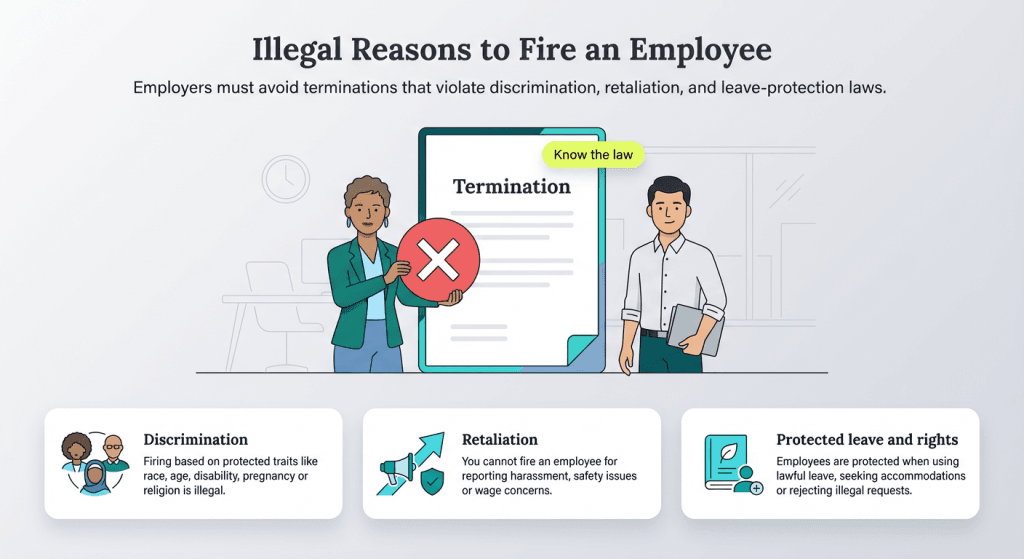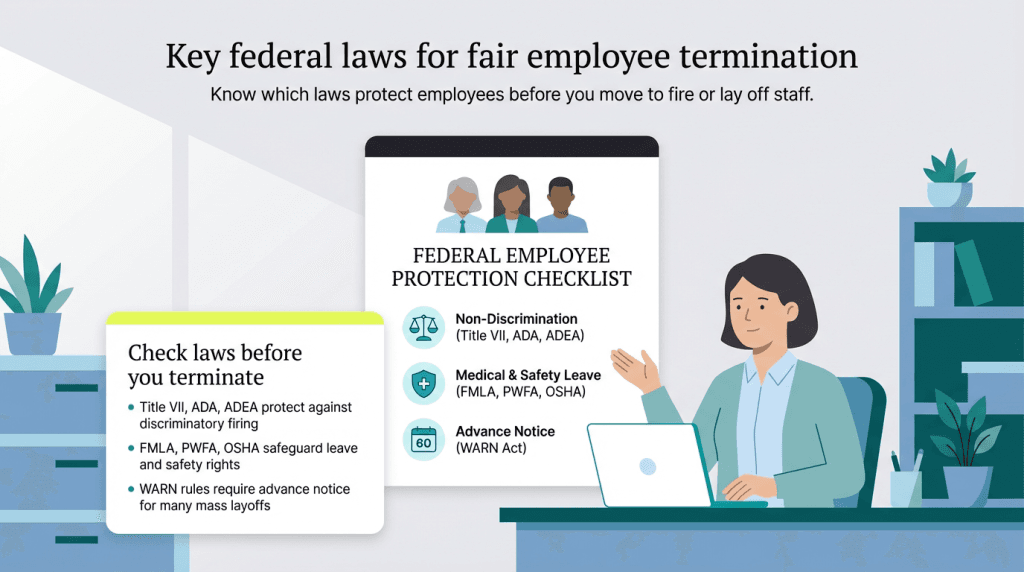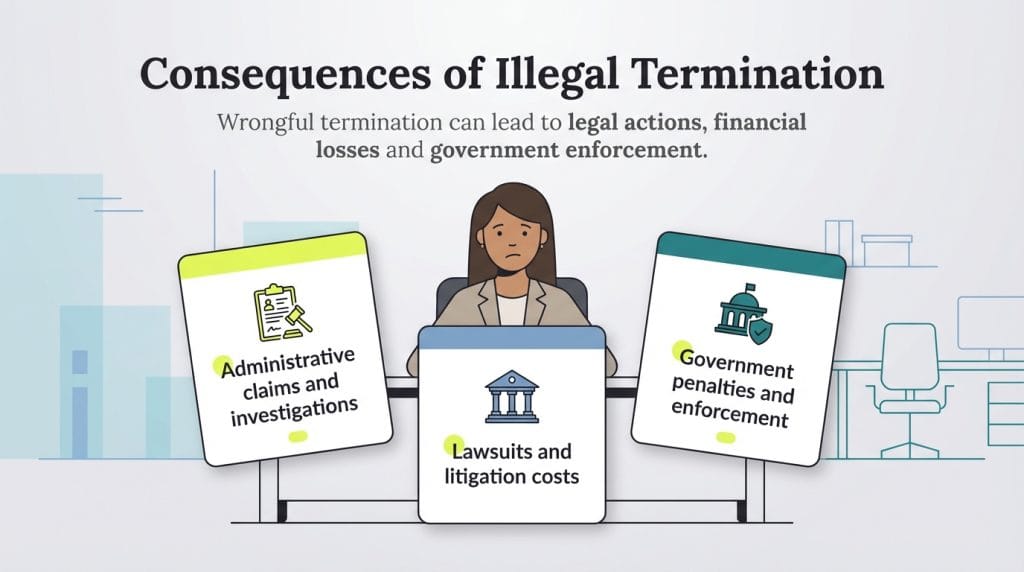Business.com aims to help business owners make informed decisions to support and grow their companies. We research and recommend products and services suitable for various business types, investing thousands of hours each year in this process.
As a business, we need to generate revenue to sustain our content. We have financial relationships with some companies we cover, earning commissions when readers purchase from our partners or share information about their needs. These relationships do not dictate our advice and recommendations. Our editorial team independently evaluates and recommends products and services based on their research and expertise. Learn more about our process and partners here.
Understanding Wrongful Termination and Illegal Firing Practices
Learn what wrongful termination is and what laws protect employees from illegal termination.

Table of Contents
Illegal firing – or wrongful termination – refers to firing someone for prohibited reasons, such as discriminatory or retaliatory behavior. Can you fire someone for no reason? While many employers operate “at-will,” there are clearly defined illegal reasons to fire someone, as well as legal grounds for termination. This article outlines what qualifies as illegal firing and the protections employees have.
- The Employer's Legal Handbook: How to Manage Your Employees & Workplace: Updated information for all 50 states. Order on Amazon.
- Wrongful Discharge Litigation Strategies: Leading Lawyers on Handling Employment Discrimination and Retaliation Cases: Ideal for the wrongly fired. Buy on Amazon.
What is illegal firing?
Wrongful termination happens when an employer fires an employee for an illegal reason. Although most terminated employees probably feel as though they were wrongfully let go, federal and state laws determine which reasons are unlawful. For example, it may be legal to terminate an employee for poor performance in a state that allows at-will termination. However, anti-discrimination laws make it illegal to terminate an employee based on their disability.
To reduce the potential for wrongful termination, always follow your organization’s internal procedures and policies for termination. Adhering to established protocols can help ensure consistency and fairness in the termination process.
In this interview, labor and employment attorney Bryn Goodman explains what every business owner needs to know about wrongful termination.
Can you be fired for no reason (at-will vs. prohibited actions)?
Yes, in nearly every state except Montana, “at-will” employment allows an employer to terminate an employee at any time, for any reason or even for no reason at all. However, even under at-will employment, employers cannot fire workers for illegal reasons (such as those identified below). Employers do not have to disclose the reason for termination unless required by contract or specific law. Being let go without stated reason may entitle workers to unemployment benefits, but it does not always point to illegality unless a protected right is involved.
Examples of illegal reasons to fire someone

Several actions can lead to wrongful termination. Most of them involve violating the employment laws and regulations set forth by federal and state governments.
If you are considering terminating an employee, ensure it is not for any of the following reasons:
1. Discrimination
Many wrongful-discharge claims happen when an employee is (or believes they have been) fired for an illegal, discriminatory reason. Several federal and state laws make it illegal to discriminate against and terminate an employee based on a protected category. This can include race, religion, color, sexual orientation, gender or gender identity, national origin, age, disability, or pregnancy.
2. Retaliation
Andrew Russell, partner at McGuireWoods, said another common basis for wrongful-termination claims occurs when an employer illegally retaliates against an employee for a protected activity that an employee might take.
“For example, an employee may report a potential safety violation, file a complaint about an underpayment of wages or report that they have been illegally harassed by a supervisor,” Russell told us. “This is all protected activity, and an employer may not fire an employee in retaliation for engaging in such activity.”
Some of the most common reasons for retaliation are when an employee:
- Opposes or reports discrimination or harassment
- Inquires about pay discrepancies
- Requests reasonable accommodations
- Files a complaint or grievance
- Reports illegal activities
- Participates in an investigation
3. Whistleblowing
Another illegal reason to terminate an employee is for whistleblowing. If your workplace is responsible for violating a health or safety regulation as mandated by the Occupational Safety and Health Administration (OSHA), you can’t terminate an employee for reporting you. Employees have the right to a safe work environment and can’t be fired for reporting hazardous workspaces.
4. Law violations
In most states, it is illegal to fire an employee because of your criminal activity. For example, it would be unlawful to terminate an employee for refusing to be complicit in breaking a law or reporting you for breaking a law.
5. Employment contract violations
It is illegal to fire an employee for any reason contrary to what is dictated in their contract. For example, written contracts may list why or how the employee may be terminated. Employees with implied contracts may be fired only for “good cause.” That’s why it’s essential to review employment contracts with a lawyer before terminating an employee.
6. Requests for protected employment leave
You may be entitled to terminate an employee for requesting employment leave. But, it’s illegal to terminate an employee for requesting any employment leave protected by laws such as the Family and Medical Leave Act (FMLA). Many states have additional paid and unpaid leave laws for things like sick, parental and military leave. So, it’s important to check your state leave laws as well.
7. Requests for reasonable accommodations
It is illegal to terminate an employee for requesting reasonable accommodations for a protected disability. For example, if an employee’s disability status changes, they are within their legal right to request reasonable accommodations — and you are legally required to provide them. The key word here being “reasonable.”
8. Public policy violations
It is illegal to terminate an employee for fulfilling their civic duty, such as attending jury duty. This right is federally protected by the Jury Systems Improvement Act (JSIA). It prohibits employers from terminating or committing other disciplinary actions against workers who are called for jury duty.
Another civic duty that may be protected is voting. Employers are not federally responsible for allowing employees to take time off to vote. However, many states and local ordinances mandate voting leave time, which you may not terminate employees from using.
9. Refusal to take a lie detector test
You cannot require an employee to take a lie detector test as a condition of keeping their job. The exceptions to this rule pertain to specific roles and scenarios. Government employers are allowed to use polygraph tests to screen hires. Similarly, pharmaceutical manufacturing and security service employers can get exceptions that allow them to require polygraph tests. The final exception applies to circumstances that result in “specific economic loss or injury to the employer,” according to the Employee Polygraph Protection Act.
10. Citizenship
It is illegal to fire a person based on their citizenship or place of birth. This is classified as a form of discrimination barred by federal law. Plus, it’s a violation of several anti-discrimination statutes.
Common grounds for legal termination
While at-will employment means most U.S. employers can terminate workers at any time, many terminations are based on legitimate and lawful grounds. Employers often cite one or more of the following reasons when ending someone’s employment.
- Poor job performance or incompetence
- Insubordination or refusal to follow instructions
- Chronic absenteeism or tardiness
- Theft or revealing proprietary information
- Workplace misconduct such as bullying, criminal behavior or fraud
- Substance abuse
- Violence or threats of violence
- Sexual harassment (when fired as the perpetrator)
- Company downsizing or restructuring
When a termination falls into one of these categories and is not motivated by discrimination or retaliation, it is generally considered lawful. However, employers should still follow proper documentation and procedures to reduce the risk of disputes.
Federal anti-discrimination laws

Federal agencies — like the U.S. Department of Labor (DOL) and EEOC — create and enforce laws to improve workplace conditions and protect employees. You and your HR department should be familiar with all of the laws that govern your business and employees. But, here are the primary federal laws you should pay special attention to when handling an employee termination:
- Title VII of the Civil Rights Act of 1964 (Title VII): This act prohibits employment discrimination based on “race, color, religion, sex or national origin.” It is illegal to terminate an employee based on any of these characteristics.
- The Americans with Disabilities Act (ADA): The ADA protects individuals with disabilities against discrimination in all areas of public life, including employment and termination. It is illegal to terminate an employee due to a disability rather than provide reasonable accommodation.
- The Age Discrimination in Employment Act of 1967 (ADEA): This act protects individuals 40 years and older from age discrimination in the workplace. It is illegal to terminate an employee because of their age.
- The Family and Medical Leave Act (FMLA): This act allows certain employees to take up to 12 weeks of unpaid leave for medical or family reasons — given that both the employer and the employee meet certain requirements. Although this act doesn’t apply to everyone, it is illegal to terminate a qualified employee for taking qualified medical leave.
- The Pregnant Workers Fairness Act (PWFA): This act protects employees within private and public sectors (with 15 or more employees), Congress, federal agencies, employment agencies, and labor organizations. It is illegal to terminate or discriminate against an employee on the basis of pregnancy, childbirth or other related medical conditions.
- The Occupational Safety and Health Act of 1970: This act protects private-sector and federal government employees from health and safety risks resulting from business activities. For example, it is illegal to retaliate against an employee for reporting a workplace health hazard to the OSHA.
- Jury Systems Improvement Act (JSIA): This act protects employees from being fired, intimidated or coerced because they serve, or are scheduled to serve, on a federal jury. Terminating an employee for fulfilling jury duty obligations is illegal under this act.
“Should an employer’s decision to fire an employee be motivated by the protected class of that employee as set forth in any of the above-referenced statutes or others, a court would likely find the termination to be discriminatory and illegal,” said Andrew Zelmanowitz, partner and employment law expert at Berger Singerman.
In addition to abiding by federal laws, employers must pay special attention to local and state laws; these laws are often stricter than federal law. For example, Zelmanowitz said, the Florida Civil Rights Act expands upon Title VII to include additional protected classes, including prohibiting discrimination based on a disability or marital status.
What is the WARN Act?
Many of the federal laws listed above dictate why you can or cannot terminate an employee, but some laws dictate how you must terminate certain employees. For example, the Worker Adjustment and Retraining Notification Act of 1988 (WARN Act) requires businesses with 100 or more employees to provide a 60-day written notice to employees prior to a mass layoff or plant closure.
“When an employer institutes a mass layoff or closes a division of its operations, it may be required to provide advance notice to employees of the impending layoff in compliance with the WARN Act,” Zelmanowitz said. “In jurisdictions where employees have additional rights by statute, compliance is required by the employer, including notice periods.”
Wrongful termination and retaliation protections
Employees are protected under numerous federal and state laws from being fired for exercising their legal rights or reporting unlawful conduct. Retaliation protections are especially broad, covering activities such as filing a discrimination complaint, reporting workplace safety violations, requesting reasonable accommodations or participating in an internal or government investigation. An employer who takes adverse action (e.g., termination, demotion, reduced hours, undesirable assignments) because of these activities may be in violation of the law.
These protections also extend to employees engaged in whistleblower activity or fulfilling civic duties, such as jury service under JSIA. Even subtle forms of retaliation can give rise to legal claims if there is a clear connection to a protected activity. Employers can reduce the risk of wrongful termination allegations by maintaining consistent documentation, applying policies fairly and seeking legal guidance before terminating an employee who has recently exercised any protected rights.
What happens if an employer illegally terminates someone?

If an employee believes they have been wrongfully terminated, they may be able to file a lawsuit against you. If this is the case, the first thing to do is to seek legal guidance from your attorney.
According to Zelmanowitz, an employer that terminates an employee in violation of federal, state or local laws — or in breach of an agreement with the employee — exposes itself to liability. This can be in the form of civil lawsuits, statutory penalties, and potentially equitable or injunctive relief that enjoins the employer from continuing to violate the laws.
- Administrative claims: According to Russell, an employee will often file an administrative claim. In this case, the employer may be subject to an administrative investigation or potential administrative hearing.
- Litigation: Litigation is another potential consequence. Russell advised that an employee “may be able to pursue his or her claims by filing a lawsuit against their employer in court.”
- Financial obligations: If the wrongfully terminated employee seeks litigation, it can cost you legal fees, back-pay damages, future wages, liquidated damages, emotional distress and/or punitive damages.
- Federal and state enforcement: “Federal and state-level agencies may seek to enforce the respective workplace laws, including criminal penalties and possibly imprisonment,” Zelmanowitz said.
To reduce the possibility of unlawful termination, seek guidance from your employment attorney before you fire an employee. Additionally, if you have made the error of wrongfully terminating an employee and are facing a wrongful-termination lawsuit, contact your attorney as soon as possible.
FAQs on illegal firing and termination rights
- Stay calm and document everything. Collect emails, text messages, performance reviews, your termination letter and witness statements.
- Request written reason for termination anytime possible.
- File a complaint. Contact your employer’s HR department and consider filing formal complaints with the EEOC (for discrimination), OSHA (for retaliation/whistleblower claims) or state labor agencies.
- Consult an employment attorney. Legal experts can assess whether you have grounds for a lawsuit and guide you through mediation or litigation.
- Pursue administrative procedures first. Reporting agencies will investigate and may facilitate settlements or issue you clearance to file a lawsuit in court.
Source interviews were conducted for a previous version of this article.











